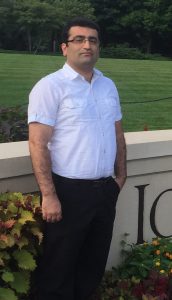 Hossein Taheri, a Ph.D. student in mechanical engineering, is paving the way for achieving quality in additive manufacturing. Taheri first started his work with the Materials Evaluation and Testing Laboratory (METLAB) within South Dakota State University while he conducted his master’s research on composite material testing and characterization techniques.
Hossein Taheri, a Ph.D. student in mechanical engineering, is paving the way for achieving quality in additive manufacturing. Taheri first started his work with the Materials Evaluation and Testing Laboratory (METLAB) within South Dakota State University while he conducted his master’s research on composite material testing and characterization techniques.
After graduating with his master’s degree, Taheri sought out some of the best nondestructive evaluation programs around the country and found a new home at Iowa State’s Center for Nondestructive Evaluation (CNDE). CNDE is one of the leaders in its field and was Taheri’s first choice.
Taheri worked with CNDE for a year and then was appointed as a research assistant for an additive manufacturing position. He says working with additive manufacturing is quite different than the industry’s standard subtractive method. “Additive manufacturing deals with a computer-generated model and then prints that model layer by layer,” he explains. “Usually this process is reserved for highly technical and critical parts.”
A common problem with additive manufacturing is that you usually cannot find a defect until the process is finished because the volatile environment sensors that detect defects cannot be placed on the material. Taheri says he wants to fix this issue with nondestructive evaluation methods, such as more advanced ultrasound that can find defects during the additive process.
Eventually, he hopes that more advanced methods will allow modifications to be made during the additive process to avoid defects and improve quality.
With such advanced technology, Taheri has his challenges cut out for him. “Finding equipment and material to use is difficult due to the high expense,” he explains. “During the experiment, you sometimes have to change the process, which means more material and requires more funding.”
He adds that there is also a lack of information on the inlying processes that occur during experiments makes learning from conventional methods and applying that information to more advanced methods a challenge.
Recently, Taheri applied for and received a fellowship from The American Society for Nondestructive Testing (ASNT) to support his work in additive manufacturing. “I was optimistic when I applied for the fellowship. My research was strong. I put a lot of hard work into it, and was able to provide great preliminary results,” says Taheri. Overall, Taheri was extremely pleased to receive the fellowship and believes it will help carry his research forward.
In the future, Taheri hopes to continue working with his research and is happy for the opportunity to work with the CNDE.